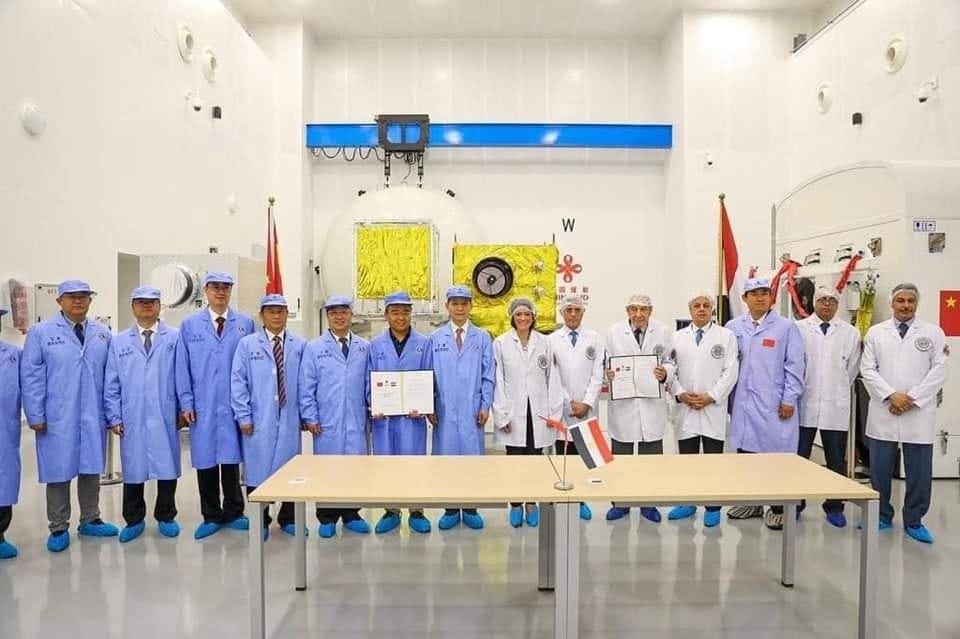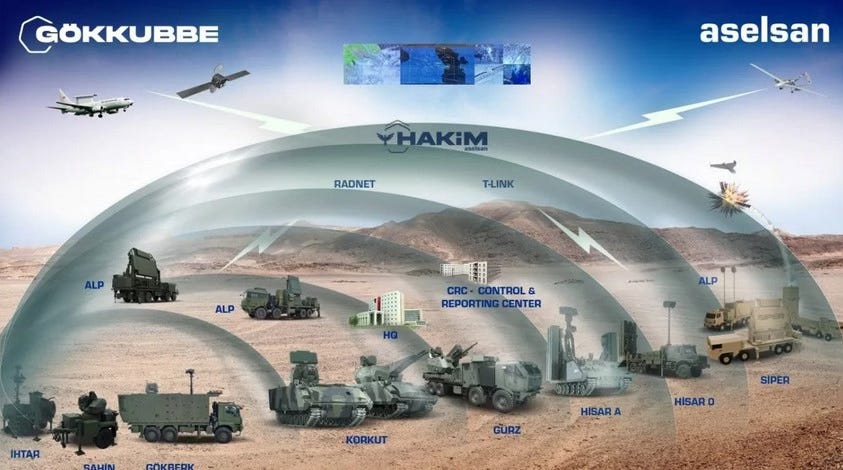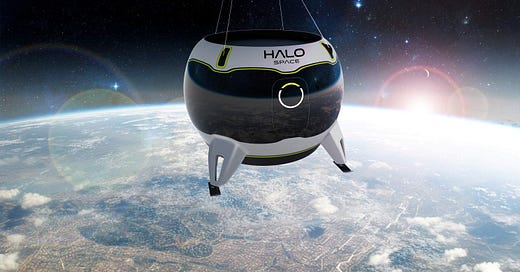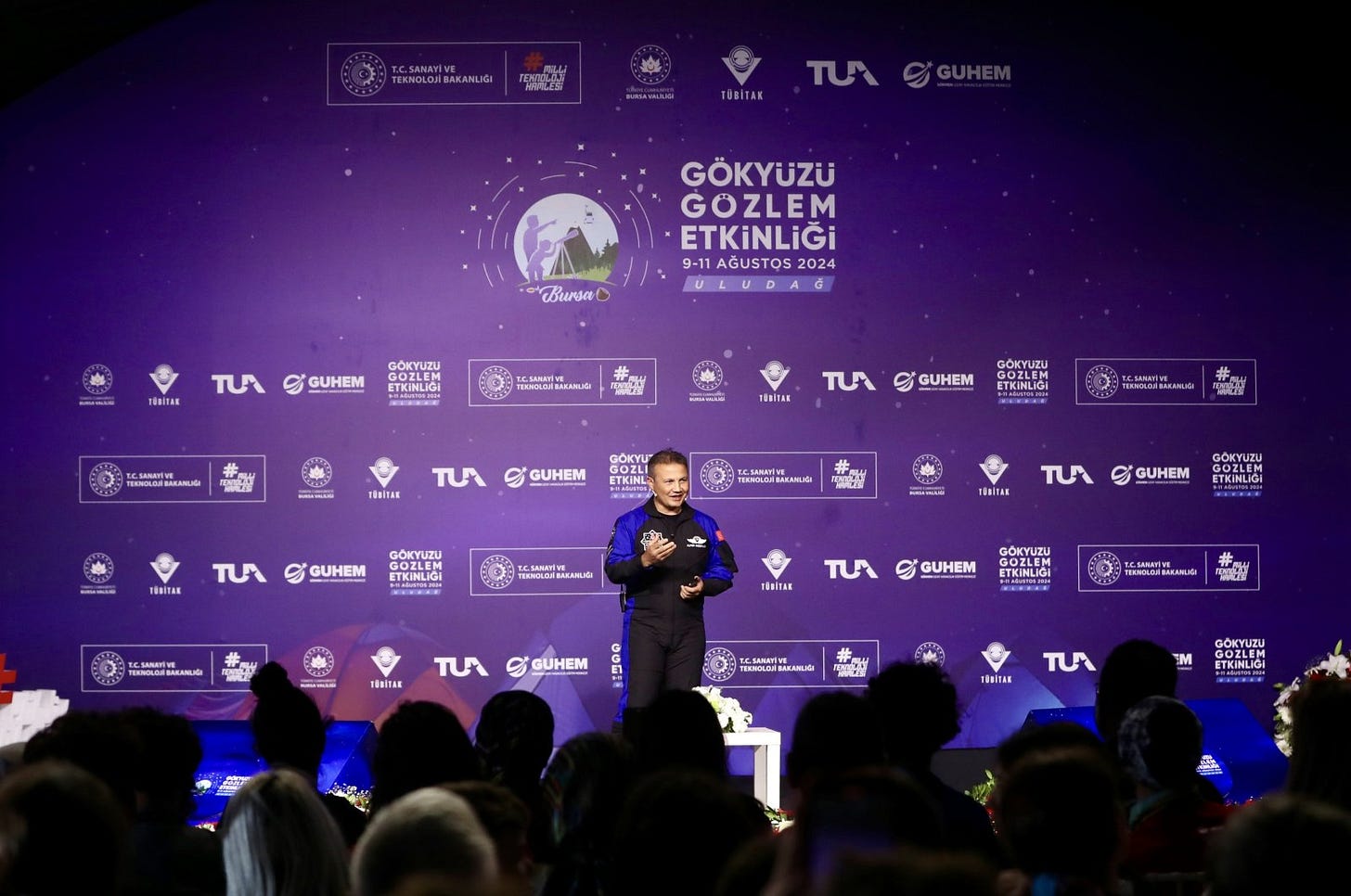Middle East Space Roundup: 5 to 11 August 2024
A summary of all the space news in the Greater Middle East over the past week, brought to you by AzurX
The following are the major space developments in the Greater Middle East region tracked by Middle East Space Monitor over the past week:
Saudi Arabia Space Developments
HALO Space to Test Space Balloon Capsule in Saudi Arabia in September 2024
HALO Space is set to conduct its next test flight in Saudi Arabia this September, in collaboration with the Communications, Space and Technology Commission (CST). The test will feature HALO Space's full-size prototype capsule, Aurora, ascending to 30 kilometers above Earth to validate critical systems developed over the past three years. This mission marks a significant step in HALO Space's development of near-space flight capabilities and highlights Saudi Arabia's growing role in supporting innovative space sector initiatives. The collaboration between HALO Space and CST emphasises the importance of public-private partnerships in advancing space exploration and technology, while also focusing on safety standards and certification procedures. This event underscores the increasing global interest in near-space tourism and technology development, positioning Saudi Arabia as an emerging player in the international space industry.
Saudi Arabia to Develop AlUla Into Space Tourism Destination
The Royal Commission for AlUla (RCU) in Saudi Arabia has formed a strategic partnership with the SETI Institute to advance the development of the AlUla Manara Observatory, marking a significant step in AlUla's transformation into a leading destination for space research and astro-tourism. This collaboration focuses on enhancing the observatory's capabilities through advanced telescope technology and data analysis systems, while also emphasising community engagement through education and knowledge sharing. The initiative aligns with RCU's long-term vision for AlUla and is a key component of Saudi Arabia's Vision 2030, which aims to diversify the economy and promote innovation. This partnership not only underscores Saudi Arabia's commitment to scientific advancement but also highlights the growing importance of space-related initiatives in the Kingdom's broader strategy for sustainable development and cultural enrichment.
Saudi Arabia’s CST Releases 3rd Annual Digital and Space Sustainability Report
The Communications, Space and Technology Commission (CST) of Saudi Arabia has released its third "Digital and Space Sustainability" report, showcasing 13 success stories from 16 public and private sector entities in the country. The report, developed in collaboration with the Ministry of Communications and Information Technology and the International Telecommunication Union (ITU), emphasises the critical role of IT and space technologies in achieving sustainable development goals. It highlights that 70% of these goals rely on digital technologies, while 40% benefit from space-derived data. The CST's digital sustainability strategy, C.I.R.C.L.E.S., focuses on promoting a circular digital economy, developing sustainability strategies, and addressing challenges such as electronic waste and space debris. This comprehensive approach underscores Saudi Arabia's commitment to leveraging technology for sustainable development and positions the country as a leader in digital and space sustainability initiatives in the region.
Azerbaijan Space News
Azerbaijan’s Azercosmos Reports H1 2024 Financial Results
Azercosmos, Azerbaijan's state space corporation, has reported revenues of $9.5 million for the first half of 2024 from its satellite and telecommunication services, which are provided to 48 countries worldwide. According to the Center for Analysis of Economic Reforms and Communications of Azerbaijan, 78% of these revenues came from exports. The United Kingdom, Luxembourg, the United Arab Emirates, Pakistan, and Germany were the top export destinations during this period. While this performance demonstrates Azercosmos' continued global reach, it's noteworthy that the agency's annual revenues have been declining over the past two years. In 2023, revenues totaled $19.8 million, a 25.56% decrease from 2022's $26.6 million. This trend highlights the competitive and evolving nature of the global satellite and telecommunications market, and underscores the importance for national space agencies like Azercosmos to continually adapt and innovate to maintain their market position.
Azerbaijan’s Azercosmos Signs Agreement with Botswana’s Civil Aviation Authority
Azercosmos, Azerbaijan's state space corporation, has expanded its reach in Southern Africa by signing a long-term agreement with the Civil Aviation Authority of Botswana. This partnership marks the first instance of Botswana receiving satellite data services via the African C-band coverage on the Azerspace-1 communication satellite. The collaboration is significant as it strengthens Azercosmos' presence in the region, where it already provides services to nearly half of the 13 Southern African countries. This strategic move is expected to enhance the deployment of Azerspace satellite services for large-scale data projects across Southern Africa, further solidifying Azerbaijan's position in the global satellite services market and potentially opening new opportunities for growth in the African continent.
Egypt Space Developments

Egyptian Officials Assess Positive Impact of Egypt-China Space Cooperation
The Minister of Planning, Economic Development, and International Cooperation in Egypt, Dr. Rania A. Al Mashat, recently met with Dr. Sherif Sedky, CEO of the Egyptian Space Agency, to discuss expanding their cooperation within the framework of the Egyptian-Chinese partnership. This collaboration has already yielded significant results, including the establishment of a Satellite Assembly, Integration, and Testing Centre and the successful launch of the EgyptSat-2 Earth observation satellite. The meeting explored potential collaborations in analytical systems and AI technologies to support Egypt's planning system and investment project monitoring. The partnership, built on a long-standing historical relationship between Egypt and China, has seen substantial advancements since 2014, with grants totaling approximately $92 million for space-related projects. This cooperation underscores Egypt's commitment to enhancing its research capabilities and remote sensing technologies, reinforcing its position in the satellite field. The ongoing collaboration between the Egyptian Space Agency and international partners, particularly China, is pivotal in advancing Egypt's space programme and supporting its broader economic and technological development goals.
Egyptian Space Agency to Host Space Conference at Egypt International Airshow
The Egyptian Space Agency (EgSA), in collaboration with Egypt International Airshow, has announced the speaker lineup for the New Space Horizons Conference – Africa and the Middle East, scheduled for 2 September 2024 in El Alamein City, Egypt. This high-profile event will bring together representatives from major space agencies across the region, including those from the UAE, Saudi Arabia, Algeria, and Bahrain, as well as intergovernmental organisations like RASCOM and the African Space Agency. The conference will address crucial topics such as space policy, international cooperation, sustainability, commercialisation, and emerging technologies. Dr. Sherif Sedky, CEO of EgSA, emphasised Egypt's commitment to peaceful space applications and its strategic focus on developing human capital and space infrastructure. This event underscores the growing importance of the space sector in Africa and the Middle East, highlighting the region's ambitions to become a significant player in the global space industry while fostering collaboration and innovation.
Israel Space News
Israel’s Gilat Satellite Networks Reports Strong Q2 2024 Financial Results
Israel’s Gilat Satellite Networks Ltd. has reported strong second-quarter results for 2024, with revenue up 13% to $76.6 million compared to Q2 2023. While GAAP operating income decreased due to acquisition-related expenses, non-GAAP operating income increased by 21% to $7.3 million. The company reiterated its 2024 guidance, expecting revenue between $305 and $325 million, representing 18% year-over-year growth at the midpoint. Gilat's CEO, Adi Sfadia, highlighted solid traction in the defense satellite communications segment and the successful integration of DataPath, acquired last year. The company also announced its intention to acquire Stellar Blu, a leader in Electronically Steerable Antenna for In-Flight-Connectivity, which is expected to significantly boost revenues in 2025 and transform Gilat into a high-growth company. This strategic move positions Gilat as a leader in the expanding ESA IFC market, with potential for long-term growth and an enhanced product portfolio.
Israeli-French Environmental Research Satellite Venμs Comes to End of Operational Lifetime
Israel’s environmental research satellite Venμs has concluded its mission after seven years of operation, surpassing its expected lifespan by more than twice. Developed through a collaboration between the Israel Space Agency and the French space agency Centre national d'études spatiales (CNES), Venμs featured advanced Israeli technology, including a hyperspectral camera capable of capturing 12 distinct wavelengths. The satellite's unique combination of spectral and spatial resolution, along with its orbit, allowed for unprecedented environmental and agricultural monitoring capabilities. Its success is evidenced by over 100 scientific publications across various fields. Despite the lack of a direct replacement, the satellite's legacy continues through ongoing data analysis. The project showcased successful international collaboration and technological innovation, particularly in the development of its sophisticated camera by Elbit Systems Electro-Optics. While the mission's conclusion marks the end of an era in environmental satellite monitoring, it also highlights Israel's growing capabilities in space technology and the potential for future advancements in this field.
Türkiye Space Developments

Türkiye to Develop Satellite-Enabled Steel Dome Air and Missile Defence System
Türkiye has announced plans to develop a comprehensive air defence system called "Steel Dome," marking a significant advancement in its national defence capabilities. This integrated system aims to combine various sensors including satellites, weapons, and layered air defence systems under a unified network structure, utilising artificial intelligence for real-time decision support. The project reflects Türkiye's growing domestic defence industry, partly driven by arms embargoes from NATO allies. However, the integration of the Russian S-400 missile system into this NATO-compatible defence network remains a critical and unresolved issue. The S-400 purchase, which led to Türkiye's removal from the F-35 fighter jet programme, presents a strategic dilemma. Some, like former official Cavit Çağlar, suggest selling the S-400s to resolve tensions with the U.S. and NATO, while President Erdoğan maintains their necessity. This situation highlights the complex balancing act Türkiye faces between its NATO commitments and its pursuit of strategic autonomy in defence. The development of Steel Dome and the S-400 question underscore the evolving dynamics of Türkiye's defence policy and its implications for regional geopolitics.
Türkiye’s Space Exploration R&D Spending Increased 146-Fold in Ten Years
Türkiye has seen a significant increase in its research and development (R&D) expenditures over the past decade, with overall spending reaching $4.14 billion in 2023, a 13-fold increase from ten years ago, according to the Turkish Statistical Institute (TurkStat). Notably, the space exploration sector has experienced extraordinary growth in R&D investment, with a 146-fold increase from $4.7 million in 2013 to nearly $63 million in 2023. This trend is expected to continue, with projections indicating that space exploration R&D spending will exceed $65 million in 2024. This dramatic surge in R&D expenditure, particularly in the space sector, underscores Türkiye's growing commitment to technological advancement and its ambition to become a significant player in the global space industry.
Turkish Astronauts Highlight Türkiye’s Opportunities in Commercial Space
Türkiye's space programme has made significant strides, as highlighted at TÜBİTAK's 26th Sky Observation Event. Alper Gezeravcı, Türkiye's first astronaut, emphasised the country's achievement as the 22nd state to send its citizens to space for scientific research. Tuva Cihangir Atasever, Türkiye's second astronaut, outlined ambitious goals of the National Space Programme, including lunar missions and spaceport development. The event underscored Türkiye's growing role in the rapidly expanding global space industry, which has already surpassed previous growth projections. Atasever noted that commercial space activities would be crucial for Türkiye's future economic development, with the space ecosystem expected to reach a value of trillions of dollars. This focus on space exploration and technology aligns with Türkiye's broader goals of national development and establishing a prominent position in the global space sector, reflecting the country's commitment to scientific advancement and economic diversification.
Other News
UAE’s Yahclick to Expand Satellite Broadband Coverage in Angola
YahClick, a leading satellite broadband service provider and a subsidiary of the UAE’s Yahsat, is reinforcing its commitment to expanding internet access across Angola following its participation in Angotic 2024. The company's Africa team recently met with Angola's Minister of Telecommunications to discuss potential collaborations aimed at bridging the digital divide in the country. YahClick's strategy involves partnering with local operators to enhance connectivity across various sectors, including agriculture, healthcare, and education. The company's high-speed connectivity solutions are designed to support Angola's digital transformation, focusing on improving productivity in agriculture, enabling telemedicine services, and facilitating e-learning initiatives. This partnership represents a significant step towards strengthening Angola's digital infrastructure and aligns with the country's goals for socio-economic development. YahClick's commitment to working closely with local stakeholders underscores the growing importance of satellite broadband in addressing connectivity challenges in developing nations and highlights the potential for public-private partnerships in advancing digital inclusion.
Analyst: Middle East Presents Significant Opportunity for SATCOM Services
Recent analysis from Analysys Mason highlights a significant opportunity for satellite service providers in the Middle East and Africa (MEA) region. Space expert Sarah Halpin notes that MEA countries are adopting varied approaches to space-based communications, with established players looking to diversify their industries while newcomers aim to improve their capabilities. The region is expected to invest $1 billion in space-related activities this year, with the UAE leading the charge following its $5.1 billion mandate to Yahsat Government Solutions in 2023. Key areas of focus include disaster response, land management, rural connectivity, and telemedicine. Halpin emphasises the need for industry players to innovate and address country-specific needs to capitalise on this potential. This analysis aligns with recent recommendations from Juniper Research, which advises companies to utilize a mix of low and geostationary Earth orbit satellites for Internet of Things (IoT) services to cater to diverse use cases in the region.
Other Regional News in Brief
Other brief developments from around the region include:
During a visit to Kazakhstan, President Ilham Aliyev of Azerbaijan discussed space cooperation with his Kazakh counterpart.
Be sure to catch up with space activities in the region in the next edition of Middle East Space Monitor’s space roundup!





